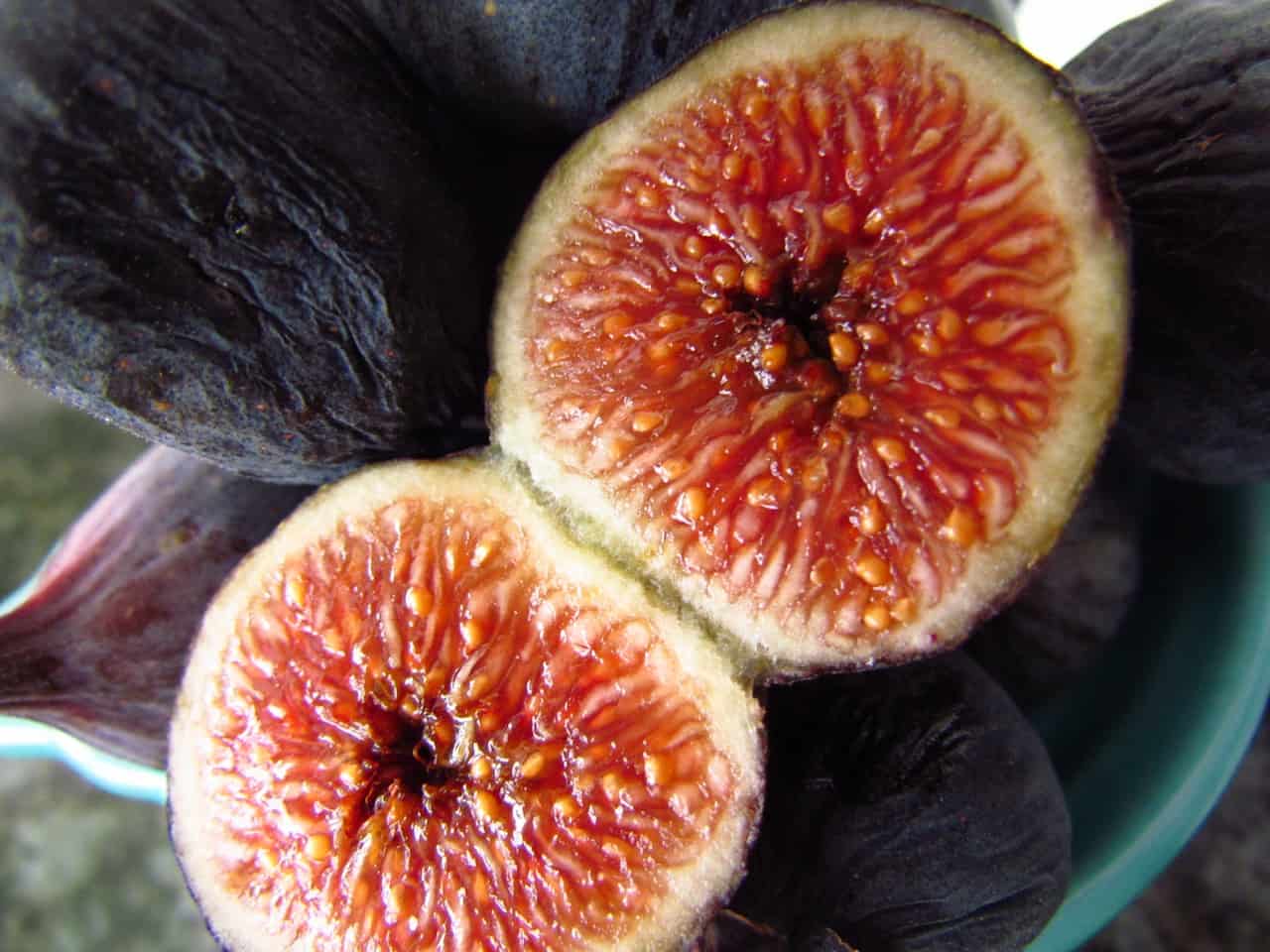Figs are common herbs and well respected for their immense health benefits. Even the Holy Bible has a record of how fig leaves were used to cure the boils of King Hezekiah in Isaiah 38:21.
One amazing thing about fig is its fast action against constipation due to its abundant source of fiber. It is also highly effective in the management of diabetes, high cholesterol, and bone health.
Figs have a good amount of calcium that helps in strengthening bones and teeth.
Well, much is known about fig leaves, but what about the fruits? Do they have any health benefits backed by science? Continue reading to find out for yourself.
What Are Figs?
Figs are sweet fruits gotten from the fig tree (Ficus). They have multiple seeds and soft skin. Fig fruits can be eaten fresh or dried.
Due to the high content of natural sugar in figs, they are nicknamed “nature’s candy”.
Like other dried fruits, dried figs are rich in phenol antioxidants and important nutrients, especially fiber.
The fiber in dried figs can help people addicted to high fructose corn syrup and carbonated soft drinks overcome oxidative stress.
What Are Dried Figs?
Dried figs are the dried form of fig fruits. They are available all through the year and found in many parts of the world.
Dried figs have a longer shelf-life than fresh figs. Fresh figs last for 1 to 2 weeks after harvest and they are best eaten within a few days.
Dried figs are made by drying them in the sun or using a dehydration procedure to extract excess water and leave behind the fiber-rich and nutrient-dense dried fruit which can be taken as snacks.
Types of Figs
Fig fruits come in many varieties and colors. Common colors are golden yellow, green, red, and purple. The most popular types of fig fruits in the world are:
- Calimyrna figs
- Sierra figs
- Brown turkey
- Kadota figs
- Black mission figs
Dried figs are available all year round and they can be gotten in almost every part of the world. Fresh figs are only found in their season which is late July.
Fresh figs are available from July till the start of fall.
How to Eat Figs?

Figs are sweet fruits and due to their soft nature, they are used in making paste. This paste is a good alternative to sugar. It is healthier and better than sucrose and corn syrup.
Fig pastes are used in making preserves, assorted baked goods, cakes, pudding, and pies. Organic turkey figs are healthy and used in making energy bars, sauce, parfait, and jams.
Fresh figs: These are low in calories and are excellent snacks to be taken inbetween meals. You can also add them to desserts or salads. Fresh figs are used in making fig jam.
Dried figs: You have to eat these in moderation because they are dense in sugar and calories. Dried figs treat constipation better than fresh figs.
Fig leaves: These might be difficult to find if fig trees don’t grow in your locality but you can buy from online health shops. Fig leaves are used in many ways as grape leaves.
They are used to wrap foods containing meat, rice, or other fillings.
Fig leaf tea: This is made from dried fig leaves and it is highly medicinal. You can make yours if you have access to a fig tree.
Get some leaves and dry them under shade and ground into powder when dry. Preserve in a glass jar. If you don’t have access to fig tree, you can purchase fig leaf tea online.
Remember to take figs in moderation because of their high sugar content. It is also an effective home remedy for constipation.
Nutritional Content of Raw Figs
100 grams of raw figs contain:
- 79.11 grams of water
- 310 KJ energy
- 0.75 grams of proteins
- 0.3 grams of total lipids
- 0.66 grams of ash
- 19.18 grams of carbohydrate
- 209 grams of total fiber
- 16.26 grams of sugar
- 35 mg of calcium
- 0.37 mg of iron
- 17 mg of magnesium
- 14 mg of phosphorous
Figs also contain a decent amount of potassium, zinc, manganese, and vitamins A, E, and K. they are also rich in polyphenols, powerful antioxidants that protect your body from oxidative stress.
Amazing Health Benefits of Fig Fruits
Reduce blood pressure
Low levels of potassium and high levels of sodium lead to high blood pressure. Figs are perfect for hypertensive patients as they are rich in potassium but very low in sodium.
Potassium dilates the blood vessels and reduces the pressure placed on the arteries and blood vessels. This, in turn, will reduce your risks of heart attack, atherosclerosis, stroke, and other cardiovascular problems.
It also lowers your risks for coronary heart disease.
Regular intake of fig fruits will help you relax well, settle your nerves, and help you stay calm. All these happen because of its blood pressure-reducing capacity.
Promotes digestion
Apart from preventing and treating constipation, figs prevent indigestion and other digestive problems. They ensure that your digestive system is working well.
The fiber in figs adds bulk to your stools thereby stopping constipation. The fiber serves as prebiotics (food) for the healthy bacteria (probiotics) in your gut.
This helps to populate the friendly bacteria thereby improving your digestion, immune system, and overall health.
Figs reduce the symptoms of ulcerative colitis and other digestive problems. They also reduce bloating and pain.
Boosts the management of diabetes
Abscisic acid is abundantly present in figs and this is a phytohormones. It increases the tolerance to glucose and has many other benefits on the body.
The abscisic acid in figs helps in reducing postpranial glucose and even regulates insulin response.
Due to the high sugar content of figs, diabetic patients should eat this fruit in moderation.
Relieves sore throat
Figs contain mucilage compounds which help in relieving the symptoms of sore throat. This slimy constituent of figs soothes irritated throats, quells inflammation, and hastens healing.
It does these by forming a protective film on the affected region of the throat.
Boosts the immune system
Fig is rich in vitamin C, a powerful nutrient/antioxidant needed by the immune system. This nutrient stimulates the production of white blood cells in your body.
These cells fight off diseases and foreign invaders, hence they are called “the soldiers of the body”. There are many other antioxidants found in figs that can improve and fortify your immune system.
Relieves constipation
This is one of the well-known benefits of figs. Due to their high fiber content, these fruits are used as complementary medicine to treat chronic constipation.
Fig bars are also given to people suffering from constipation.
Boosts healthy liver functions
Fig fruits help your liver work well and also boosts detoxification since the liver is the major organ of detoxification in the body.
They bring down elevated levels of enzymes to normal. Fig also help alcoholics have normal liver functions.
Help cancer patients
Fig leaves and the natural latex from the tree have been studied and they showed anti-tumor activity against human cancers of the colon, cervix, liver, and breast.
This does not mean that only fig leaves will heal cancer, you need to combine it with other therapies and a good diet.
Preserves vision
Vitamin A is found in figs and this nutrient boosts vision and protects your eyes from damage by free radicals.
This can help to enhance night vision, reduce the development of cataract, and prevent macular degeneration.
Help with piles
A popular and ancient folk remedy for pile is dried figs. Soak dried figs in water overnight and take the fruit along with the water the following morning.
This remedy has powerful laxative effect and thereby reduces the pressure on the anus. This helps in soothing hemorrhoids.
Figs have been used for centuries in treating piles and other related condition due to their anti-inflammatory, antispasmodic, and laxative properties.
Help with chronic diseases
Inflammation and chronic diseases can be effectively managed and even reversed by increasing your intake of vitamins, minerals, and antioxidants.
Figs are rich in these nutrients and can help reduce oxidative stress in your system. This, in turn, prevents and helps relieve the symptoms of chronic diseases like rheumatoid arthritis, heart disease, etc.
Reduces cholesterol
Anjeer, (name for fig in India) increases the levels of good cholesterol and also improve one’s lipid profile.
Pectin, a soluble fiber found in this fruit stimulates healthy bowel movement. As the fiber in figs move through your digestive tract, it mops up excess cholesterol and eliminates them from your body via stools.
Boosts weight loss
The rich content of fiber in figs can keep you feeling full for a long time thus reducing food intake. This helps in preventing unnecessary eating or overeating.
Reduce the symptoms of Alzheimer’s
Mental health can deteriorate as one ages, especially if they didn’t live a healthy life and eat good foods during their youth.
As these people age, they produce cytokines which are highly inflammatory and cause Alzheimer’s disease in humans.
Due to the anti-inflammatory properties of figs, they are of huge benefits to people suffering from neurodegenerative conditions like Alzheimer’s disease.
Studies have also proven that figs improve memory in people suffering from poor memory. Its powerful antioxidant effect is responsible for this as it prevents and reverses oxidative damage.
Rich source of potassium and calcium
Figs are rich in many minerals but it has very high amount of calcium and potassium.
People who take in a lot of sodium in their meals will expel calcium through their urine thereby putting them at risks of calcium deficiency.
The high content of potassium in figs can prevent the urinary loss of calcium, thereby reducing your risks of bone problems and calcium deficiency.
Potassium regulates the contents of wastes in the urine and it also increases the elimination of uric acid and other harmful toxins in your body.
Dried figs are very rich in calcium and help prevent osteoporosis.
Improves skin health
Figs prevent the loss of water from your skin and also help the production of melanin. It increases the quantity of sebum and boosts skin hydration.
They are rich in polyphenols and flavonoids. These are powerful antioxidants that prevent the damages caused by free radicals.
Figs are also rich in alkanes and these compounds help in regulating the pH of your body.
Fig fruits are used to treat eczema, psoriasis, and other skin conditions. They are also rich in vitamins E and C which give your skin a powerful boost.
These vitamins are antioxidants that eliminate free radicals and they stop oxidative stress. Oxidative stress cause age spots, wrinkles, and other blemishes.
Figs also improve skin elasticity and keep you looking young.
Protect from venereal diseases
Figs prevent and provide relief from venereal diseases by applying the fig salve. It has a calming property.
These fruits can be ingested or applied topically to provide relief from sexual transmitted diseases.
Improves bone density
Calcium is abundantly present in figs and this can prevent bone loss, osteoporosis, and other bone problems.
People at risk of bone problems can include dried figs in their diet regularly to protect their bone density.
Figs also prevent demineralization of bones that happens in aging people who are acidic.
Does Fig Fruits Have Side Effects?
Figs are naturally sweet fruits so they should be consumed moderately as excess of it can cause diarrhea. It can also cause tooth decay and other sugar-related problems.
Some people are allergic to certain chemical compounds in figs or to the figs themselves. So you have to be sure you don’t react to fig before taking them regularly.
Allergic reaction to figs can be mild to severe. Also, if you are booked for surgery, don’t consume figs in excess in the first few weeks leading to your surgery.
This is to reduce the risk of bleeding because excess figs can cause bleeding in the digestive tract of sensitive people.
Excess figs taken at a time can cause diarrhea or other digestive problems. It is also rich in vitamin K and excess can thin blood.
So people on blood-thinning medications should be careful not to overeat figs.
If you are allergic to birch pollen, you might be allergic to figs as well.
Sources;
- Figs nutrient profile NAY , SD , USDA , NCBI , NCBI ,
- Immune-boosting effects of figs SL , SD , ACS , NCBI , SL , NCBI ,
- Figs and diabetes SL , PDF , ADA,
- Plant constituents of figs WOL , NCBI , NCBI ,
- Digestive health and figs NCBI , NCBI , NCBI , NCBI , NCBI , NCBI , NCBI ,
- Cancers and figs NCBI , NCBI , NCBI , NCBI ,
- Fig allergy NCBI ,
- Figs and piles NCBI ,
- Figs and cardiovascular disease NCBI ,
- Figs and mental health NCBI , NCBI ,
- Figs and skin health NCBI ,








